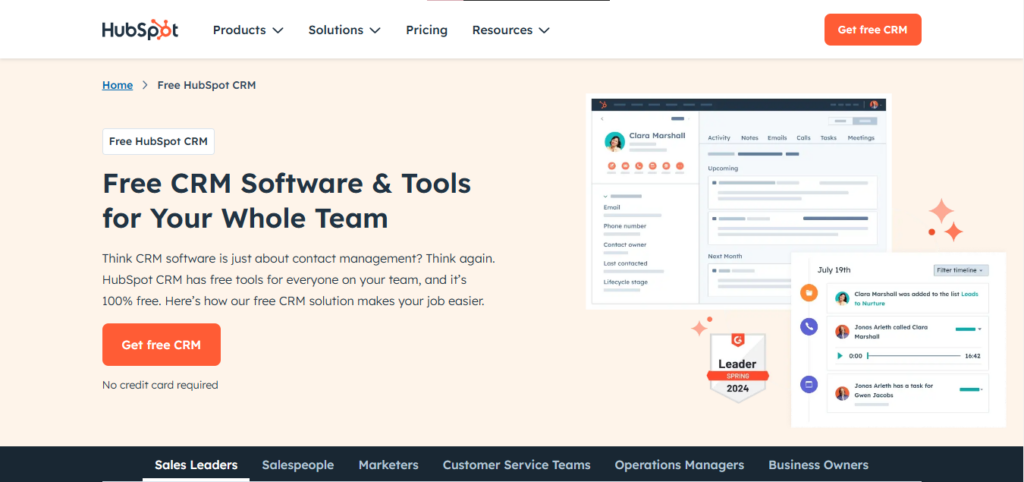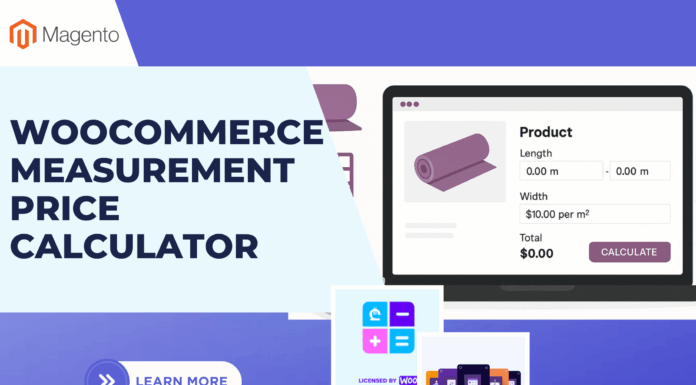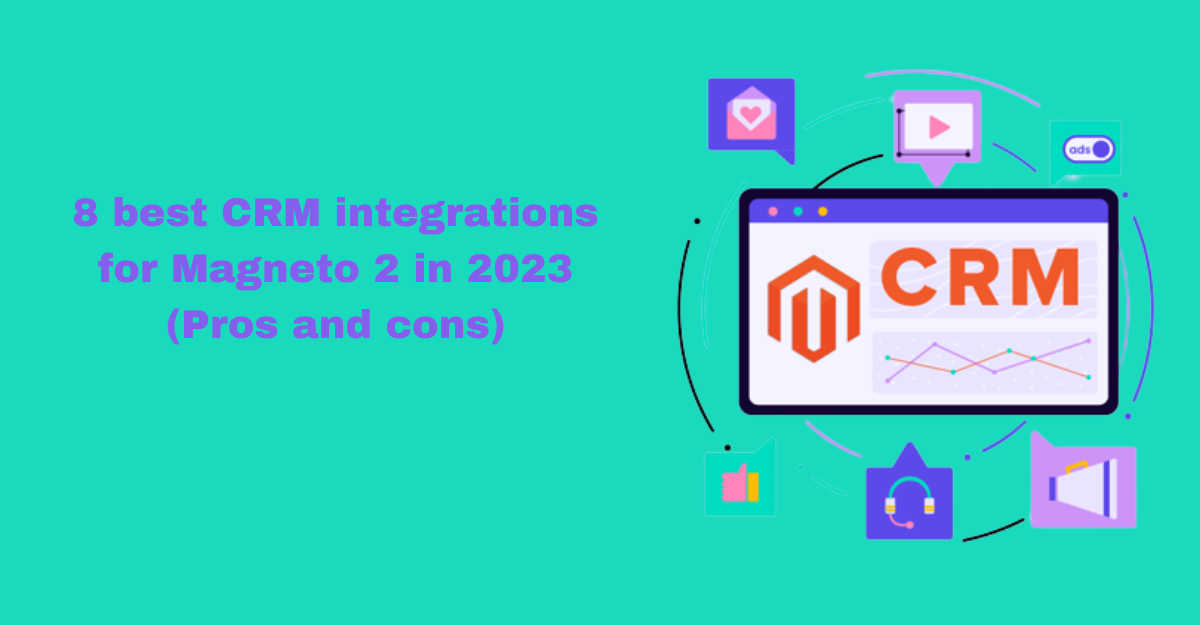
Keeping in touch with your consumers is essential in the ever-evolving field of e-commerce. Today’s successful firms rely heavily on customer relationship management (CRM)
programmes. When paired with Magento 2, the undisputed king of e-commerce, a tremendous synergy is generated that has the potential to radically alter the manner in which virtual stores are operated.
In this in-depth guide, we’ll take a look at the eight top CRM extensions for Magento 2 and go through each one’s advantages, disadvantages and real estate CRM features. After you gain insight into these, you may make well-informed decisions that propel your online business to new heights.
Table of Contents
Top 8+ CRM integrations for Magento 2
Without further ado, let’s go through the 8 best CRM softwares and tools to leveral your business this year!
#1. HubSpot
HubSpot is head and shoulders above the competition when it comes to handling client relationships. Magento 2 integration offers a symphony of lead generation, operational efficiency, and data analysis capabilities. Because of how efficiently HubSpot and Magento 2 connect with one another, businesses can quickly exchange customer data and run hyper-specific advertising campaigns.
PROS:
- When used together, HubSpot and Magento 2 simplify customer relationship management.
- The advanced automation features of HubSpot allow for faster marketing, while the platform’s customisation options allow for one-of-a-kind interaction with customers.
- HubSpot’s reporting and analytics functions let businesses adjust their marketing approaches in light of hard data.
CONS:
- HubSpot’s paid plans may be out of reach for new firms or those with a limited customer base.
- HubSpot has a steep learning curve, especially for users who have never worked with a customer relationship management system before.
#2. Salesforce
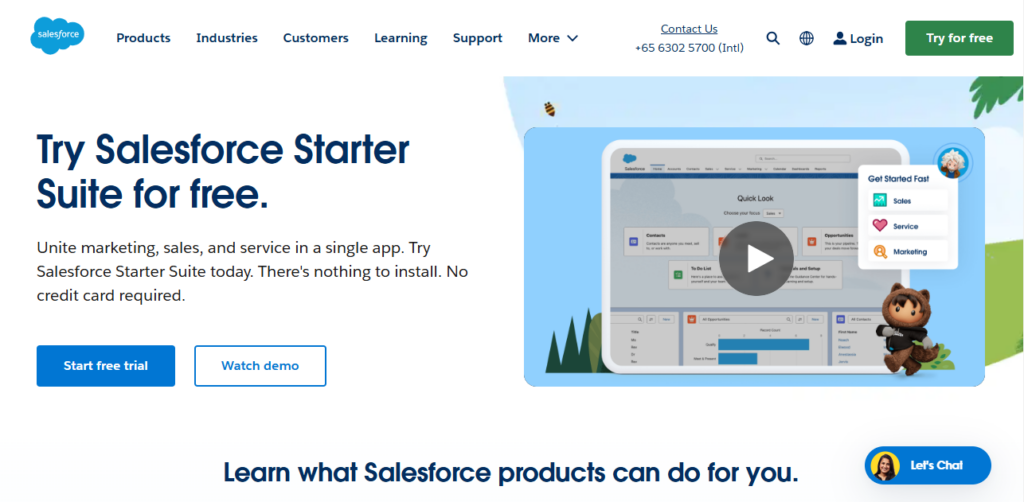
Salesforce is unrivaled in the realm of customer relationship management (CRM). Integrating Magento 2 allows a wide range of useful functions, such as lead management, customer interaction analysis, and sales forecasting.
PROS:
- Lead management, opportunity monitoring, and sales forecasting are just a few of the many CRM functions that Salesforce provides.
- There is a wide variety of complementary applications, so it can be readily customized to meet the needs of any business.
- Because of its scalability, Salesforce can be used by businesses of various sizes, from startups to multinational conglomerates.
CONS:
- Some clients, particularly those at smaller businesses or those without in-house IT professionals, may feel overwhelmed by Salesforce’s extensive feature set.
- The final cost of a repair is determined by a variety of factors. Price may increase as a result of optional extras and alterations.
#3. Zoho CRM
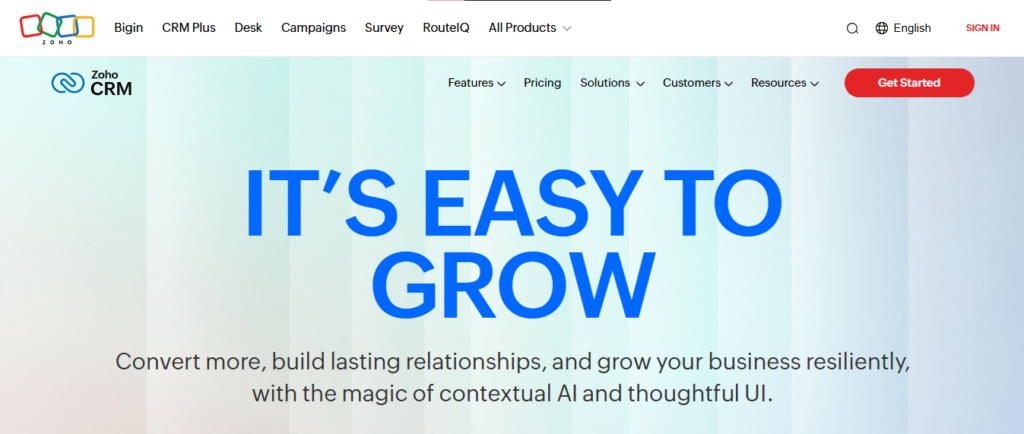
Zoho CRM is a viable option if your company needs a powerful customer relationship management solution without breaking the budget. Due to its low cost and intuitive design, companies of all sizes may benefit from its compatibility with Magento 2.
PROS:
- As a low-cost alternative that doesn’t skimp on core CRM features, Zoho CRM is a great choice for firms watching their bottom line.
- The intuitive design of the platform means that groups may get to work with little guidance and time spent learning how to use it.
- Zoho CRM’s flexibility and ease of integration mean it can meet the demands of a wide variety of businesses.
CONS:
- While Zoho CRM excels at the basics, it may not be enough for businesses that want specialized or sophisticated features.
#4. SugarCRM
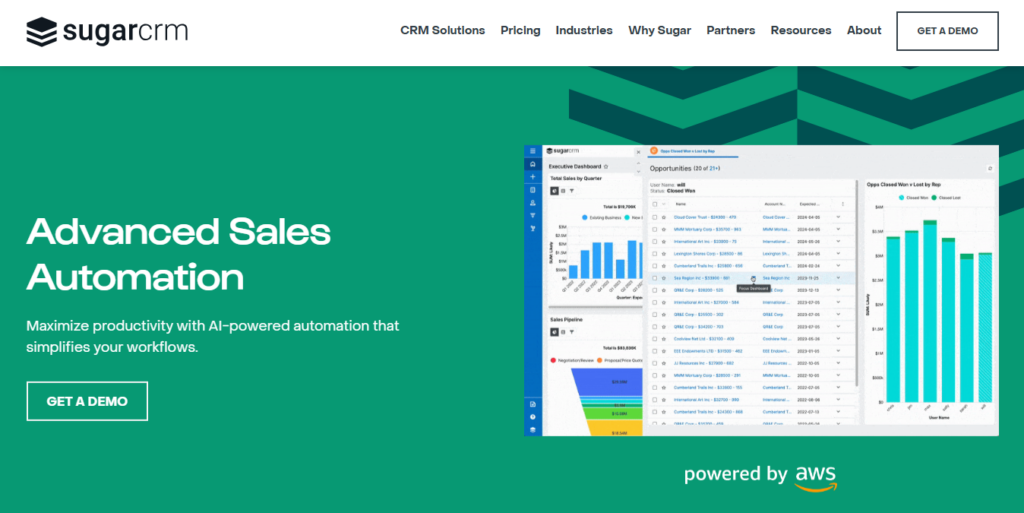
SugarCRM’s open-source version is free to use, more advanced features may come at a high cost for businesses who want to take advantage of them. One of Magento 2’s strengths is its ability to automate workflows, which, when paired with lead management and sales operations, may result in significant simplifications for both.
PROS:
- The open-source version of SugarCRM allows enterprises the ability to adapt the CRM software to match their own needs.
- Powerful workflow automation tools are the platform’s strong suit, allowing businesses to create efficient, standardized sales processes.
- Companies may get a better knowledge of their sales performance and customer behaviour with the help of SugarCRM’s in-depth reporting and analytics tools.
CONS:
- Due to its open-source status and inherent complexity, SugarCRM may need more technical expertise than competing alternatives in order to install and customise.
- While the open-source version is free to use, more advanced features may come at a high cost for businesses who want to take use of them.
#5. Zendesk Sell

Zendesk Sell, formerly known as Base, streamlines the process of monitoring leads and connecting with clients. Its ChatGPT 5 and Zendesk Sell are both accessible through the company’s website. Due to Magento 2’s intuitive design and widespread acceptance among staff, customers are more likely to have a great shopping experience.
PROS:
- Because of Zendesk Sell’s user-friendly interface, organizations can quickly get up and running. Zendesk’s strengths include its simple UI and quick sales cycle.
- This sales funnel solution stands out as the simplest among its competitors because of the transparency it offers in terms of presentation.
- Integrating with Zendesk’s customer support platform, Zendesk Sell ensures a seamless handoff between the sales and support teams and a consistent experience for the customer.
CONS:
- Zendesk Sell may give less features in the realm of marketing automation in comparison to other CRM systems because of its exclusive concentration on sales.
#6. Agile CRM
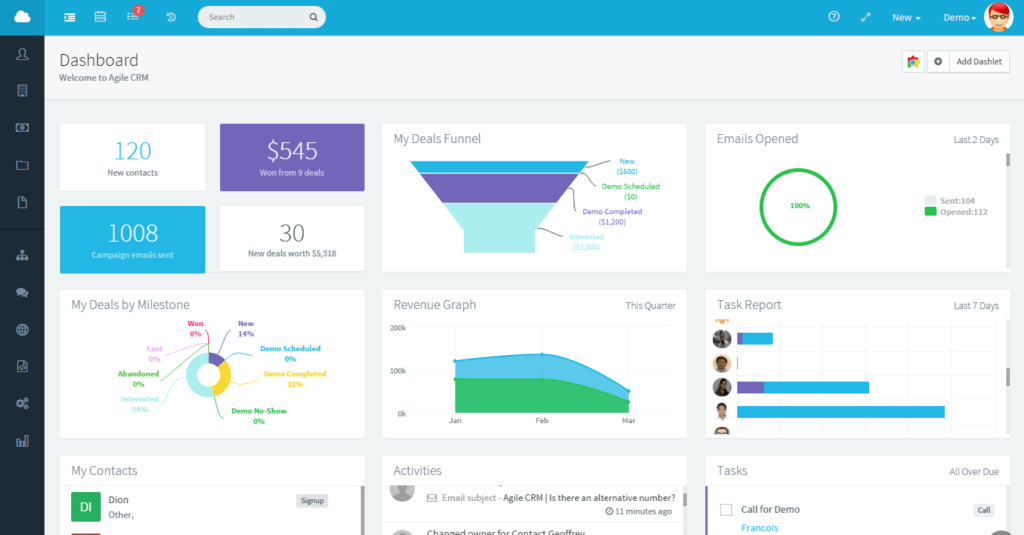
Agile CRM is a one-stop-shop for customer care since it combines customer relationship management, marketing automation, and customer service. Because of its flexibility, Magento 2 may be integrated into pre-existing systems to improve customer service.
PROS:
- Companies may save time and effort by adopting Agile CRM’s one platform for customer service, marketing, and support.
- It’s cost-effective, so even medium- and small-sized businesses may consider it if they need a complete answer.
- A company’s email contacts with clients may be tracked and even automated with the help of agile CRM software.
CONS:
- If you’re new to CRM, you may find Agile CRM’s abundance of customization possibilities overwhelming.
#7. Freshworks
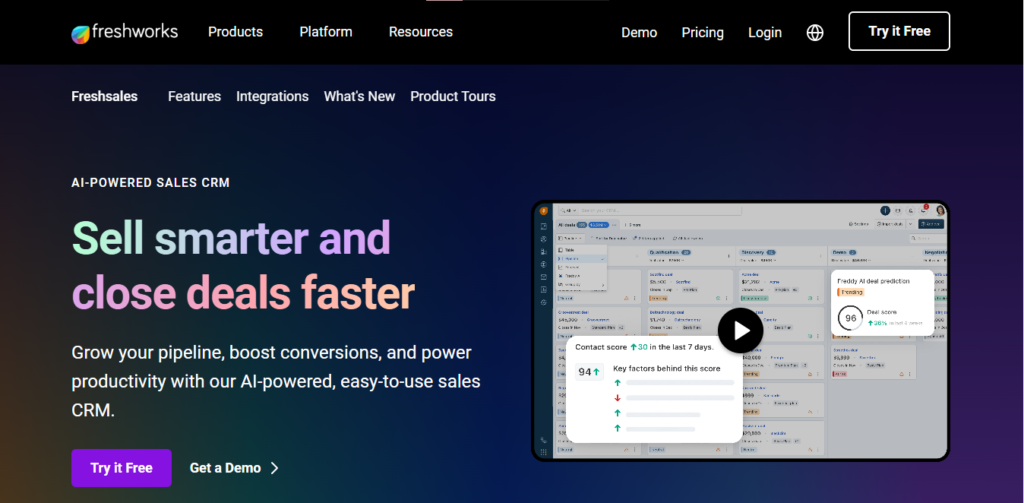
One way in which Freshsales stands apart is via its innovative lead scoring and user engagement tracking. When combined with Magento 2, it provides businesses with robust tools for filtering inbound leads and zeroing in on the best of the bunch.
PROS:
- Freshsales offers lead scoring and engagement monitoring that might be useful to businesses.
- Artificial intelligence is the driving force behind Freshsales’ ability to provide actionable insights and solutions for enhancing the sales process.
- Freshsales’ pricing is customizable and may be within the price range of any business.
CONS:
- For businesses that need a lot of customization choices, Freshsales may not be as adaptable as other, more robust CRM alternatives.
#8. Pipedrive

The big picture of a company’s sales activities is provided by Pipedrive’s visual sales pipeline visualization. When integrated with Magento 2, a user-friendly but robust platform is produced for managing the whole sales process.
PROS:
- Because of Pipedrive’s user-friendly interface and straightforward depiction of the sales process, leads can be tracked and managed with no effort.
- There are built-in prompts to follow up on leads and finish up on projects, which is a great feature.
- Pipedrive’s adaptability originates from the fact that it can be used with so many other kinds of business software.
CONS:
- While Pipedrive’s marketing automation features might need some improvement, the company’s sales management features are unparalleled.
Conclusion
As a result, the best CRM connection for Magento 2 will ultimately rely on your company’s objectives, priorities, budget, and available infrastructure. Before selecting a platform, it is essential to evaluate its features against your requirements. It is possible to improve customer interactions, optimize sales processes, and fuel growth with a well-implemented customer relationship management system.








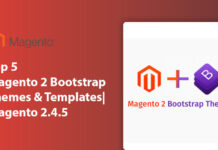



![[SALE OFF] Discount 30% All Premium Extensions On Christmas And New Year 2025 christmas-and-new-year-2025](https://landofcoder.b-cdn.net/wp-content/uploads/2024/12/christmas-and-new-year-2025-1-218x150.png)




